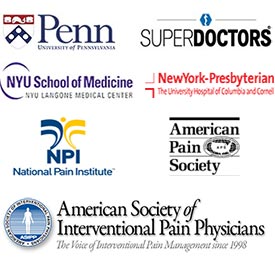Tendonitis Pain Knee Specialist Doctors NYC
At Manhattan Pain and Sports Associates you’ll get the tendontis diagnosis, pain management, and best in class medical care you need to reduce or eliminate your knee pain. Because when you’re in pain — whether it’s from a sports injury, accident, age or ailment — you want relief. Appropriate and targeted tendonitis treatment starts with a diagnosis from one of our specialists.
Tendons are the soft tissues that attach your muscles to your bones. Since your knees are the most heavy-duty joints in your body, it makes sense that the tendons and muscles in your knees are heavy-duty too. Normally, the tendons in your knees work perfectly, even under stress. They are tough ribbons of fiber that can take abuse…up to a point.
If you have tendonitis in the knee, it means your tendons are inflamed. The inflammation causes pain, tenderness and swelling. You’ll feel the pain from tendonitis either just below or just above your kneecap. The pain may go away if you rest your knee and keep weight off it, but if it comes back when you return to playing sports or exercising, then it’s likely tendonitis. If it gets bad enough, you’ll continue to feel pain even when resting.
Causes and Risks of Knee Tendonitis
Tendonitis is what’s known as a “repetitive strain injury.” Your knee tendons can become inflamed as a result from doing the same stressful movements over and over. Certain knee-intensive sports and exercises can put you at risk for tendonitis of the knee, including:
- Skiing
- Jogging
- Basketball
- Volleyball
- Treadmill workout
- Jumping aerobics
These activities are particularly risky if you engage in them periodically but powerfully, without doing any other conditioning to prepare. Playing competitive sports once a week can put you at risk for developing tendonitis of the knee if you get no other exercise during the week.
As with other knee conditions, tendonitis can come on gradually. As you age, your tendons naturally become more rigid, limiting your flexibility. If you try to do at 50 what you could do at 30, you may hurt your knees. If your hamstrings and quadriceps muscles are tight, you also risk injuring your knees.
Treating Tendonitis of the Knee
When you first feel the pain in your knee, stop whatever you’re doing. Wrap your knee in ice to reduce the swelling. Even if the pain and swelling subside with rest, your best bet in Manhattan is to get your knee checked out by a pain management specialist. You may be tempted to resume your activities, whether it’s a sport or exercise, but the pain and swelling likely will come back once you start again.
Stanford Pain & Sports Medicine of NYC can diagnose tendonitis of the knee and give you the treatment you need to really heal the inflamed tendons, while keeping you pain-free. It may take several weeks to several months for your knee to fully recover from tendonitis, so give it the time and rest it needs. Other pain relief treatments your doctor may prescribe include:
- Specific stretches to increase your flexibility
- Certain exercises to build strength in your knee joint
- Physical therapy to accomplish both goals
- Steroid injections for the pain and swelling
Get the Tendonitis Relief You Need
Your NYC pain management doctor will do his / her best to get you back to your normal routine with minimal downtime. After your diagnosis is confirmed, your doctor begins your treatment plan with the most conservative pain relief treatment. You’ll always receive non-invasive pain relief before your doctor turns to more invasive procedures like surgery.
Manhattan Pain and Sports Associates
51 East 25th St, 4th Floor, Ste B
New York, NY 10010
(212) 533-3954



